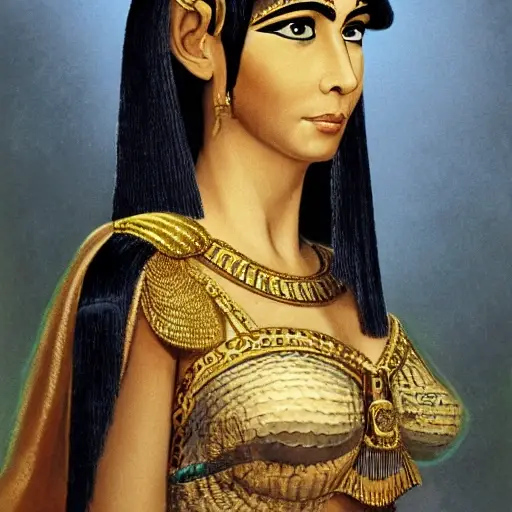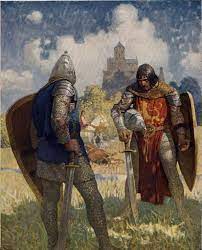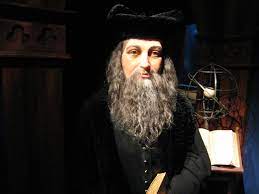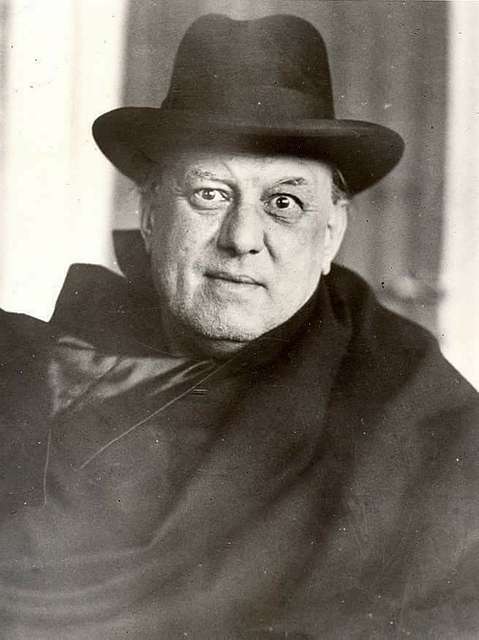In this article, we will explore the lives of 10 historical tales who are said to have experienced encounters with the supernatural tales. From ancient civilizations to more recent times, these individuals have fascinated generations with their inexplicable experiences and the enduring myths that surround them. Join us as we delve into the realm of the supernatural and uncover the intriguing stories that intertwine history and the paranormal.
History is filled with captivating tales of extraordinary individuals who have left an indelible mark on the world. Among these figures are those who have been associated with supernatural phenomena, adding an air of mystery to their already remarkable stories.
Cleopatra : top of Historical Figures with Supernatural Tales

Cleopatra, the last active ruler of the Ptolemaic Kingdom of Egypt, was not only known for her beauty and political prowess but also her alleged supernatural encounters. Legends claim that Cleopatra possessed the power of prophecy and was visited by spirits who foretold her destiny. It is said that she often consulted oracles and sought guidance from the spirit world, helping her make strategic decisions. These supernatural beliefs contributed to her mystique and her ability to captivate those around her, solidifying her place in history.
Joan of Arc
Joan of Arc, the French peasant girl who led the French army to several victories during the Hundred Years’ War, claimed to have received divine guidance from saints and angels. She believed that she had been chosen by God to liberate France from English rule. Joan’s visions and supernatural experiences fueled her determination and inspired her followers. Despite facing persecution and eventually being burned at the stake, her legacy as a symbol of courage and faith remains firmly rooted in history.
King Arthur

King Arthur, the legendary British king who led the defense against Saxon invaders, is surrounded by tales of magic and enchantment. The most famous account is the story of the sword Excalibur, said to have been bestowed upon Arthur by the Lady of the Lake. The sword’s supernatural powers elevated Arthur’s status and played a central role in his quest for justice and unity. Although the historical existence of King Arthur is debated, the supernatural elements associated with his legend continue to capture the imagination of people worldwide.
Rasputin
Grigori Rasputin, the enigmatic figure who had a significant influence on the last Russian royal family, is shrouded in supernatural tales. Known as the “Mad Monk,” Rasputin was believed to possess extraordinary healing abilities and the power to predict the future. His association with the occult and rumors of his supernatural connection to the Russian Imperial Court added to his mystique. Despite his controversial reputation, Rasputin’s supernatural aura has made him an enduring symbol of intrigue and fascination.
Nostradamus

Michel de Nostredame, commonly known as Nostradamus, was a French physician and astrologer who gained fame for his prophecies. Nostradamus claimed that he could foresee future events through his divination techniques. His writings, known as the “Prophecies,” have been interpreted by many as predictions of major world events. While skeptics question the legitimacy of his prophecies, Nostradamus’ reputation as a seer has persisted throughout history, making him one of the most renowned figures associated with supernatural foresight.
Aleister Crowley

Aleister Crowley, the British occultist and writer, is undoubtedly one of the most infamous historical figures associated with supernatural tales. Known as “The Great Beast” and the founder of Thelema, a religious and spiritual system, Crowley’s life was intertwined with the mystical and the occult. He believed himself to be a prophet and sought to explore the boundaries of human consciousness through various esoteric practices. Crowley’s encounters with the supernatural were numerous and often controversial, cementing his reputation as a figure immersed in the realms beyond the ordinary.
One of the most notorious supernatural tales surrounding Crowley is his alleged ability to communicate with spirits and entities from other dimensions. He claimed to have summoned and conversed with various deities and demons through ceremonial magick and ritual practices. Crowley’s work in the field of ceremonial magick, particularly his involvement with the Hermetic Order of the Golden Dawn and later the Ordo Templi Orientis, showcased his fascination with the occult and his desire to tap into hidden sources of knowledge and power.
Furthermore, Crowley’s interest in the supernatural extended to his exploration of astral projection and the astral plane. He believed that through astral travel, one could detach their consciousness from the physical body and explore different realms and dimensions. Crowley claimed to have achieved astral projection on multiple occasions, documenting his experiences and encounters with spiritual entities during these journeys. His writings on the subject, particularly in his book “The Book of Lies,” have become influential within occult circles.
Crowley’s reputation for engaging in dark and controversial practices, such as sex magick and ritualistic ceremonies, has only added to the mystique surrounding him. His libertine lifestyle and unorthodox beliefs, including his emphasis on personal freedom and the pursuit of one’s true will, pushed the boundaries of societal norms and garnered both intrigue and disdain from his contemporaries.
The supernatural tales surrounding Aleister Crowley continue to captivate and polarize individuals interested in the occult and the esoteric. Whether seen as a visionary or a charlatan, Crowley’s impact on modern occultism cannot be denied. His writings, rituals, and teachings have influenced numerous individuals and occult organizations, leaving a lasting legacy that continues to shape the exploration of the supernatural and the pursuit of spiritual enlightenment.
While Crowley’s encounters with the supernatural may be subject to skepticism and interpretation, they reflect his relentless pursuit of hidden knowledge and his willingness to challenge conventional beliefs. Crowley’s exploration of the supernatural and his unyielding dedication to the occult have made him an enduring figure in the realm of esotericism, embodying the allure and enigma of historical figures with supernatural tales.
Abraham Lincoln
Abraham Lincoln, the 16th President of the United States, was not only known for his leadership during the tumultuous times of the American Civil War but also for his intriguing connection to supernatural tales. Throughout his life, Lincoln’s encounters with the supernatural were often discussed and shared, adding an air of mystery and intrigue to his already remarkable legacy. One of the most well-known supernatural tales associated with Lincoln is his alleged premonitions and dreams. It is said that Lincoln had a remarkable ability to foresee events and had prophetic dreams that foreshadowed significant moments in his life and the nation’s history. One such instance occurred shortly before his assassination when he dreamt of his own funeral, an eerie coincidence that left him unsettled. These prophetic dreams and premonitions fueled speculation about Lincoln’s psychic abilities and his connection to the unseen.
Another supernatural tale surrounding Lincoln is his alleged encounters with the spirits of the deceased. It is said that Lincoln held seances in the White House, attempting to communicate with the spirits of departed loved ones and seeking guidance from the other side. His wife, Mary Todd Lincoln, was known to have a deep interest in spiritualism, and it is believed that they both engaged in these spiritual rituals together. These seances and attempts to communicate with the dead were considered unconventional for a sitting president, but they reflected Lincoln’s open-mindedness and his willingness to explore the unknown.
Furthermore, Lincoln’s fascination with the supernatural extended to his belief in ghosts and haunted places. It is said that he believed the White House to be haunted, with several reports of paranormal activities, including the ghostly apparition of former President Andrew Jackson. Lincoln himself claimed to have seen the ghost of his deceased son, Willie, in the White House. His belief in the afterlife and the presence of spirits added a spiritual dimension to his character and shaped his understanding of the world around him.
The supernatural tales surrounding Abraham Lincoln reflect his complex personality and his willingness to embrace the mysterious and unknown. They add depth to his character and highlight his curiosity about the unseen forces that shape our lives. Whether these encounters with the supernatural were products of an imaginative mind, a deep-seated belief, or simply a reflection of the times in which he lived, they contribute to the enduring fascination surrounding Lincoln’s legacy.
While it is difficult to ascertain the veracity of these supernatural tales, they demonstrate the enduring appeal of the supernatural in human history and the ways in which it intersects with the lives of even the most prominent historical figures. Abraham Lincoln’s connection to the supernatural adds an intriguing layer to his already remarkable story, reminding us that even the most rational and logical individuals can be captivated by the mysteries of the unseen.
Empress Elisabeth of Austria
Empress Elisabeth of Austria, popularly known as Sisi, was not only renowned for her beauty and royal status but also for her intriguing connection to supernatural tales. Throughout her life, Empress Elisabeth was said to have had several encounters with the supernatural, leading to widespread speculation and fascination. One of the most notable supernatural tales surrounding Elisabeth was her alleged ability to communicate with the spirits of the dead. It was rumored that she would hold seances and attempt to contact departed loved ones, seeking solace and guidance from the other side. Elisabeth’s interest in the occult and spiritualism was considered unconventional for a royal figure of her time, and it added an air of mystery and intrigue to her already captivating persona.
Empress Elisabeth’s fascination with the supernatural extended beyond her interest in spiritualism. She was also known for her premonitions and prophetic dreams, which intrigued those around her. It was said that Elisabeth had an uncanny ability to foretell events and foresee tragedies, leading some to believe that she possessed a heightened intuition or a connection to the spiritual realm. Her dreams and visions were often interpreted as omens, and she would take them seriously, sometimes altering her plans or making decisions based on these supernatural experiences.
Furthermore, Elisabeth’s interest in the supernatural was reflected in her personal beliefs and practices. She was known to carry talismans and amulets, seeking protection and guidance from mystical forces. The empress also had a deep fascination with astrology and would consult astrologers to gain insights into her future and the events that lay ahead. Her interest in these esoteric subjects was not widely embraced by the royal court, further adding to her reputation as an enigmatic and unconventional figure.
The supernatural tales surrounding Empress Elisabeth of Austria captured the imagination of both her contemporaries and subsequent generations. They added an element of mystique to her already intriguing persona, elevating her from a mere royal figure to a figure shrouded in intrigue and fascination. The stories of her ability to communicate with spirits, her prophetic dreams, and her interest in mystical practices painted a picture of a woman who sought solace, guidance, and a deeper understanding of the unseen forces that shape our world.
While it is difficult to ascertain the truth behind these supernatural tales, they highlight the complex nature of historical figures and their beliefs. Empress Elisabeth’s interest in the supernatural reflects the human fascination with the unknown and the desire to find meaning and connection in realms beyond our comprehension. Her exploration of these realms, whether driven by genuine belief or personal curiosity, contributed to the enduring allure and mystique surrounding her legacy. Empress Elisabeth of Austria remains an intriguing figure, not only for her royal status but also for her supernatural tales, which continue to captivate and spark the imagination of those fascinated by the realms beyond our senses.
Harry Houdini
Harry Houdini, born as Erik Weisz on March 24, 1874, in Budapest, Hungary (then part of the Austro-Hungarian Empire), was a renowned Hungarian-American illusionist and escape artist. Houdini is widely regarded as one of the greatest magicians and performers in history, known for his daring escape acts and captivating stage presence.
Houdini’s family immigrated to the United States when he was a child, and he grew up in Wisconsin. He initially began his career in show business as a trapeze artist, but his real fame came from his incredible escape acts. Houdini became known for his ability to free himself from seemingly impossible situations, such as handcuffs, chains, and straitjackets, both on stage and in public stunts.
His performances were marked by a combination of showmanship, physical agility, and a deep understanding of locks, restraints, and illusions. Houdini’s escapes often involved breathtaking feats, such as submerged underwater escapes, suspended straitjacket escapes while hanging from skyscrapers, and even escaping from locked milk cans.
Apart from his escape acts, Houdini also had an interest in debunking spiritualists and exposing fraudulent mediums. He investigated and exposed various tricks and methods used by these practitioners, aiming to bring rationality and skepticism to the public’s perception of the supernatural.
Houdini’s fame and popularity as a performer grew rapidly during the late 19th and early 20th centuries. He toured extensively, both in the United States and internationally, thrilling audiences with his death-defying stunts and illusions. Houdini’s performances showcased his exceptional physical abilities, charisma, and a deep understanding of misdirection and illusion.
Tragically, Houdini’s life was cut short when he passed away on October 31, 1926, at the age of 52 due to complications from a ruptured appendix. However, his legacy as a master escape artist and magician lives on, influencing generations of illusionists and performers who strive to capture the same level of excitement and awe that Houdini brought to the stage.
Alejandra Pizarnik
Alejandra Pizarnik was an Argentine poet and writer known for her introspective and evocative works. Born on April 29, 1936, in Buenos Aires, Pizarnik grew up in a culturally rich environment that nurtured her creativity. She began writing poetry at a young age and quickly gained recognition for her unique voice and poetic sensibility.
Pizarnik’s poetry often delved into themes of identity, solitude, death, and the human condition. Her work was deeply introspective, exploring the complexities of the self and the elusive nature of language. She employed rich symbolism, surreal imagery, and a hauntingly lyrical style to create a sense of emotional intensity and ambiguity.
Throughout her career, Pizarnik published several poetry collections, including “La tierra más ajena” (1955), “Los trabajos y las noches” (1965), and “Extracción de la piedra de la locura” (1968). Her poems were characterized by their concise and precise language, often conveying a sense of melancholy and existential longing.
Pizarnik’s writing was deeply influenced by her own struggles with depression, existential crises, and a sense of alienation. She sought solace and understanding through her art, using poetry as a means of self-expression and exploration. Her introspective poems offered a glimpse into her inner world, where vulnerability and introspection coexisted.
Tragically, Pizarnik‘s life was cut short when she died by suicide on September 25, 1972, at the age of 36. Despite her untimely death, her poetic legacy remains influential and continues to resonate with readers and scholars worldwide.
Alejandra Pizarnik’s work continues to be celebrated for its raw emotional power, lyrical beauty, and philosophical depth. Her poems invite readers to contemplate the complexities of human existence and the profound longing for connection and meaning. Through her words, Pizarnik leaves behind a lasting impact on the world of literature, inspiring generations of poets and readers alike.
Conclusion
Throughout history, numerous historical figures have been intertwined with supernatural tales, adding an extra layer of fascination to their already remarkable lives. From Cleopatra’s prophetic visions to Alejandra Pizarnik’s exploration of the unconscious, these individuals have left an indelible mark on the realms of both history and the supernatural. Whether their encounters were real or embellished by folklore, the mystique surrounding these figures continues to captivate and inspire. The intersection of history and the supernatural invites us to ponder the mysteries of the past and the inexplicable forces that have shaped our world. As we delve into these tales, we are reminded that the human fascination with the supernatural is a timeless pursuit, connecting us to both the extraordinary and the unknown.

